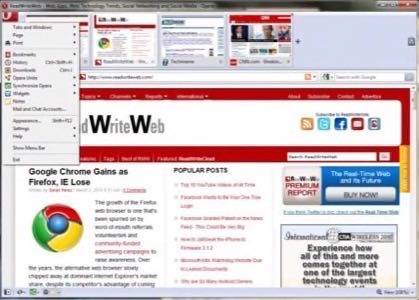The browser wars are back with a vengeance. In no small part thanks to the efforts of Google Chrome, we have seen a resurgence in browser inovation and a new emphasis on speed over the last year and a half. Today, Opera is launching its newest weapon against Chrome, Firefox and Internet Explorer. Billed as the “world’s fastest browser,” Opera 10.50 for Windows – which also sports a new user interface – might just be Opera’s best browser to date. The question, though, is if this new release will be enough to help Opera gain new users and market share.

For now, Opera has only released the final version of Opera 10.50 for Windows. Mac and Linux versions will follow soon. You can already download beta versions for these systems here.
Currently, Opera commands somewhere between 2% and 3% of the desktop browser market, which, if we look at it from a glass-half-full perspective, means that there is a lot of room to grow for the Norwegian browser developer.

Speed and Features
New Features:
- private browsing
- support for HTML5 and CSS3
- better integration with native systems
- notification messages are now non-modal
- improvements to the search box and the address box
- new and improved highlighting
- new in-line page search and password manager
- new and improved user interface design
With this new version, Opera introduces new features, as well as a new JavaScript engine (Carakan) and an improved rendering engine (Presto 2.5). In our own informal tests, Opera managed to best both the latest releases of Chrome and Firefox. For users, however, these artificial benchmarks are only a small part of the user experience and the speed difference between most modern browsers is relatively negligible compared to other bottlenecks in the rendering process.
New features, besides the updated user interface, include better integration with Windows 7 and Vista, an enhanced private browsing mode, visual tabs and improved support for CSS3 and HTML5. Opera now also features an Office 2007-like menu button that replaces the standard menu bar and packs all of the program’s settings and options into a more compact interface.
Just like earlier versions, Opera 10.50 also includes a built-in mail and RSS client, as well as Opera Turbo for faster surfing on slow networks, Opera Unite (an integrated web-servers – see our full review here) and Opera Link, which allows you to synchronize bookmarks, preferences and notes between different machines that use Opera.
Verdict
Without doubt, the biggest draw of Opera 10.50 is its speed, however. The browser feels extremely snappy, though in our tests, Opera 10.50 also used quite a bit of memory. The Opera team also worked hard on improving the user interface, which is now a lot cleaner.
So is this a browser worth switching for? In terms of features, it definitely bests every other major browser on the market, but the absence of a thriving extension and plugin ecosystem will surely hold a lot of people back from even giving it a try. If you are not bound to a certain Firefox or Chrome plugin, however – or if you are using Internet Explorer – Opera 10.50 is definitely worth a try.

















